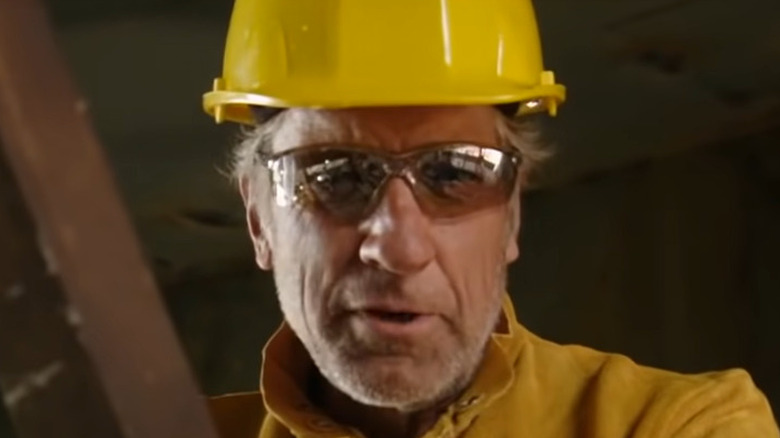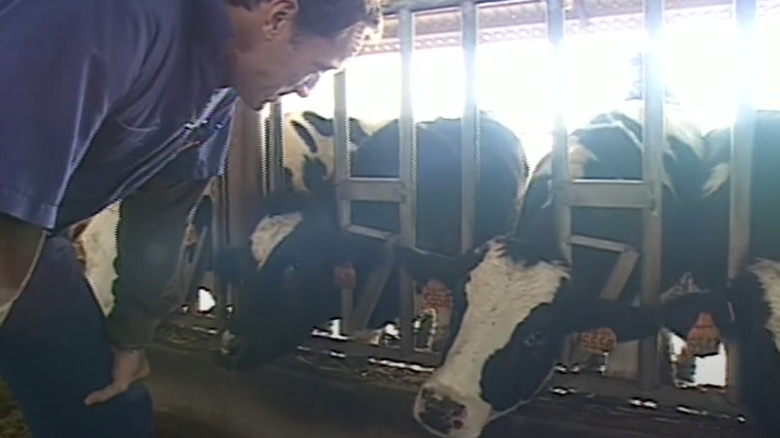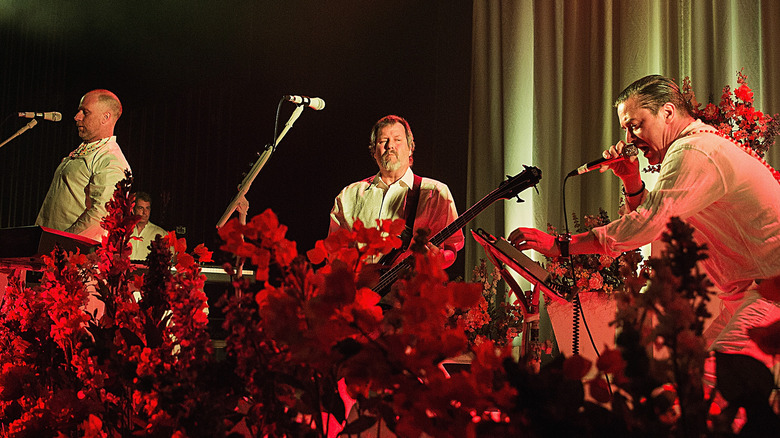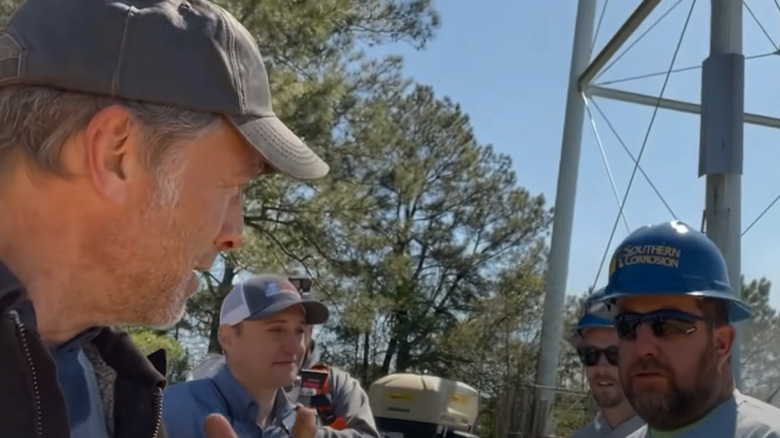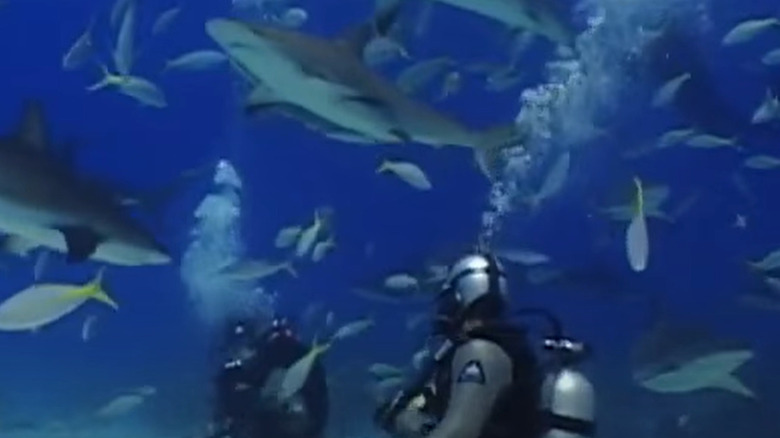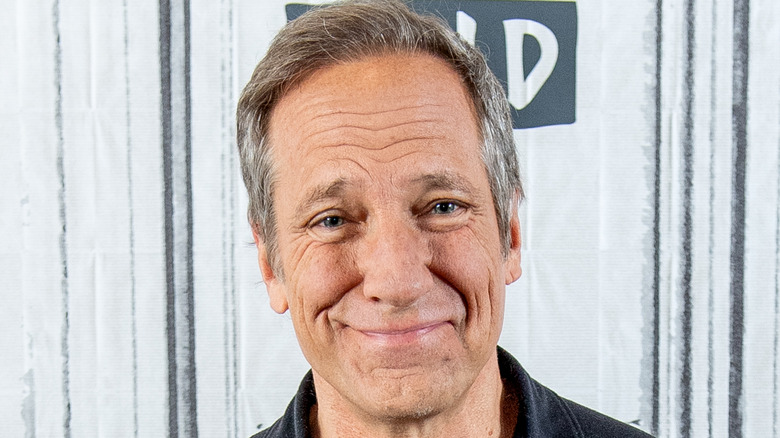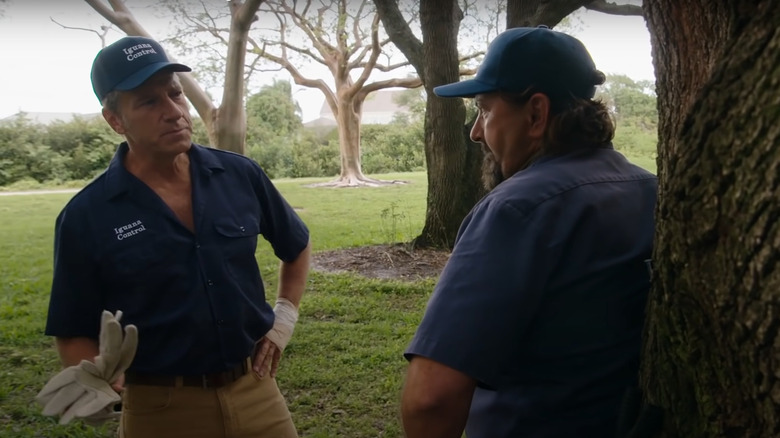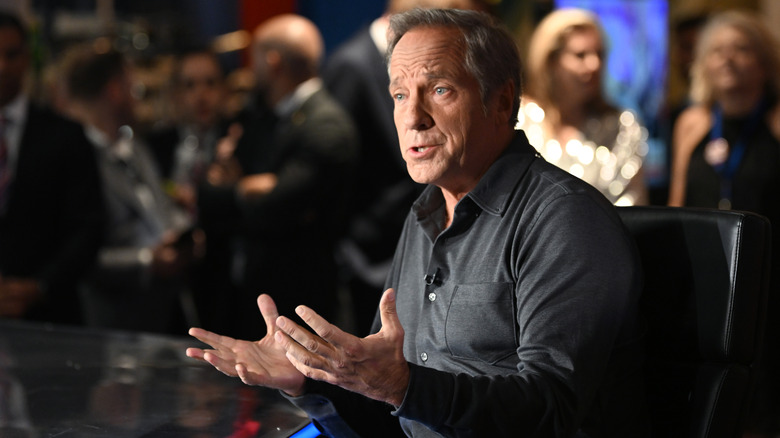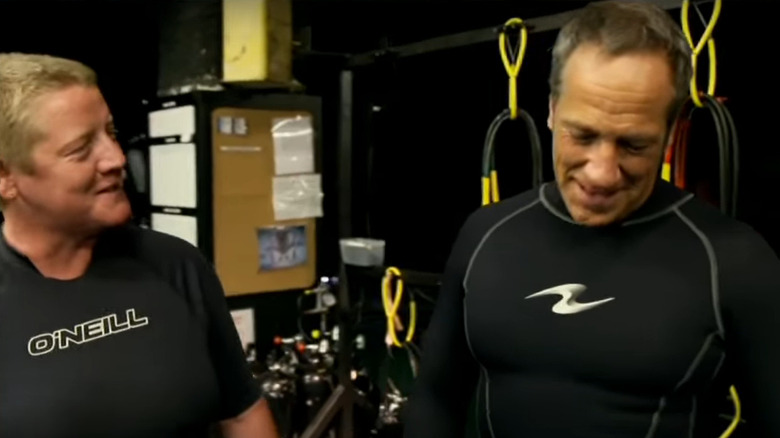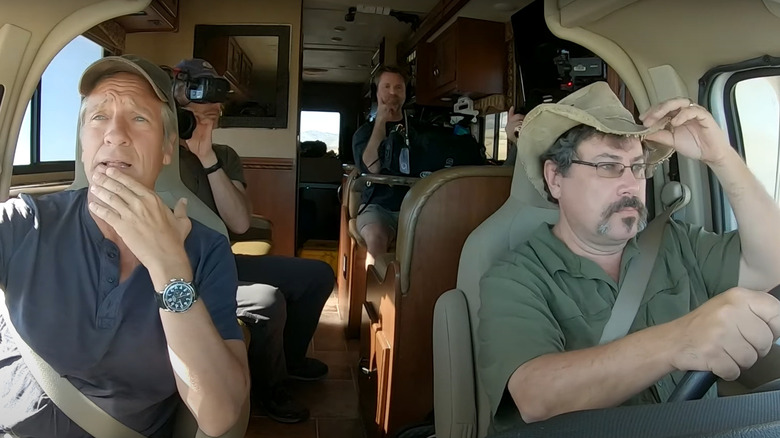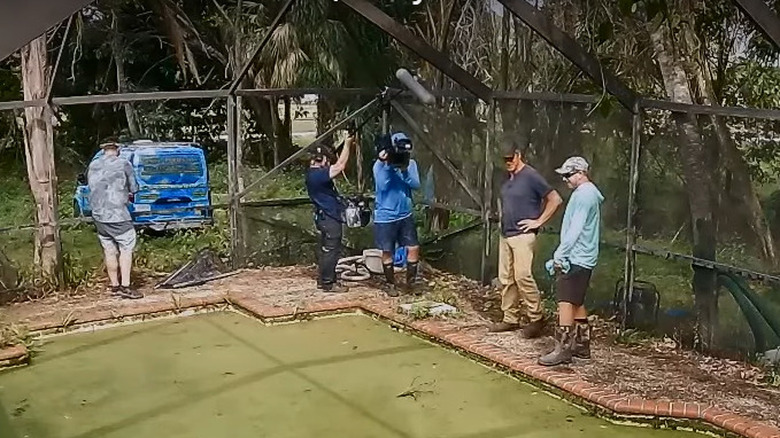Things Only The Biggest Fans Of Dirty Jobs Know
Reality TV: It's an oft-mocked genre of television, and going into that genre can seem a dirty prospect — but it brings in the ratings, so somebody's gotta do it. For almost 20 years, Mike Rowe and the crew of "Dirty Jobs" have used reality TV to highlight workers far removed from the gloss of show business. Since 2003 (with gaps), the Discovery Channel hit has put Rowe in the position of a novice, enduring crash courses on difficult, unusual, and often literally dirty lines of work.
The jobs featured are many and varied. Episodes have highlighted work vital to health and safety, like cleaning out hurricane barriers or cleaning wastewater treatment pumps. There have been segments on the making of everyday items we take for granted, like charcoal or tanned hides. And then there's the weird, at least on first glance; who knew that you could make a living finding out which baby chickens were male and female (per Wired)?
It seems a point of pride with Rowe that "Dirty Jobs" strives for a genuinely unrehearsed product. And he's keen to have the professions take the spotlight. "It's an honest look at work through the lens of an honest day," he told People while promoting the series' 2021 revival. "We never know what's going to happen, but we always have a good time and we always wind up learning more than we thought we would."
It was initially a failed segment of Good Morning America
There's no one way to hatch a hit TV show. Some are treasured brainchilds of a driven artist, some are calculated out in the offices of network executives, and some are amorphous, shifting and growing with time. What became the Discovery Channel's "Dirty Jobs" started out as a beer-fueled conversation in a San Francisco bar between a recently hired host and a local CBS affiliate producer.
The host was Mike Rowe, who tells this story on his personal website, and the producer was James Reid. With executives at the affiliate putting the pressure on for new segments on the series "Evening Magazine," Rowe seized on the idea of being put into demanding situations above his pay grade, inspired by George Plimpton's "Paper Lion." Reid's contribution was a choice to eschew anything glamorous and instead go to local workers in blue-collar jobs. The inaugural episode of the segment, then called "Somebody's Gotta Do It," focused on a zoo employee who had to drive a truck full of animal droppings.
"Somebody's Gotta Do It" became a local success, but within a year, new management decided the segment didn't fit their desired viewership. Rowe wanted to expand the concept anyway, and he pitched it as a segment for "Good Morning America," leading with an episode on artificially inseminating cows. They, and other networks, all passed until Rowe got in touch with old colleagues at Discovery.
The theme song was briefly replaced due to a rights snafu
What does a successful TV show need? Technically, just a functional set of cameras, microphones, and a platform to air on. But there are plenty of bells and whistles that accompany popular programs. A good theme song, whether written specifically for a series or licensed and adopted, can do a lot to establish or reinforce a show's identity.
The theme song for "Dirty Jobs" is "We Care A Lot" by Faith No More. It isn't necessarily a tailored fit; according to AllMusic, "We Care A Lot" was originally intended as a satire on charity records and concerts. But its lyrics do include the refrain "it's a dirty job but someone's gotta do it." Incidental music for the series has been written by Matt Koskenmaki, who has included the tracks on his personal website.
For a brief period, Koskenmaki's music was all that could be heard on "Dirty Jobs." Fans tuning in for the 2007 season were quick to notice that "We Care A Lot" wasn't playing under the titles anymore. Mike Rowe himself offered an explanation on the Discovery Channel website's message board: it was a legal issue. "The rights to 'We Care A Lot' were either not renewed on time, or not properly acquired in the first place," he wrote, as put off by the change as fans were. The song was later restored, and the newest seasons feature a cover.
The people on the job meet Mike Rowe for the first time on camera
There's a certain degree of artifice to reality TV no matter the format; none of us goes through life with a set of cameras and an editing bay to slice all that coverage up into half-hour or hour segments. But the minds behind "Dirty Jobs" try not to impose too much of a framework on the careers they feature. "We're not doing a reality show, at least in the normal convention," host Mike Rowe told Wired. While conceding that he does break the fourth wall to address viewers, Rowe insisted that he has no agenda when he arrives at a job site and that his goal is to present things as they are.
In service to that goal, Rowe keeps away from the workers he'll be featuring in a given episode for as long as possible. The first time he speaks with them is typically the moment they're introduced on camera. Rowe also told Wired that he's keen to avoid having anyone play to the cameras or be too aware of the fact that they'll be on television. It's become a more difficult order over the years, as "Dirty Jobs" and Rowe himself are increasingly well-known. He tries to minimize that by not playing the TV host. "The way to behave on these shoots," he said, "is to look at yourself as a genuinely interested viewer who just happens to have clipped on his microphone."
Mike Rowe took a literal bite for Shark Week
TV networks can have strange gimmicks. People can have strange jobs. Sometimes, those two things come together. One of the Discovery Channel's claims to fame is its annual Shark Week programming block, the longest-running such block in television history (per The Atlantic). "Dirty Jobs" being a Discovery program, it contributed an episode to the 2006 season. And that episode put host Mike Rowe into contact with an usual — and unusually dangerous — profession: shark suit tester.
As Rowe told the story on his website, he and the "Dirty Jobs" crew arrived in the Bahamas, where the first order of business was to learn about a shark repellant spray made from dead sharks. Rowe's first experience in keeping sharks at bay came when he was required to jump into a pack of reef sharks chowing down on chum released by a research lab and test out the spray. It worked, if Rowe's continued presence as the show's host didn't give that away.
After the spray came the shark suit. This piece of diving wear is essentially chain mail made from steel mesh. Fifty feet below the water's surface, Rowe and his featured guest, Jeremiah Sullivan, dove into another pack of sharks summoned by blood and guts and let themselves get bit to see how well the suits held up. It was a terrifying experience for Rowe, but the mail did its job; he and Sullivan swam away with nothing but bruises.
Season 1 saw Mike Rowe in a bad accident with a furnace
When a show styles itself "Dirty Jobs," there's an expectation set that the audience will see literal dirt, muck, grime, and other, fouler things. And the series has often embraced that expectation. "My show is 'Jackass' with a purpose. It's 'Fear Factor' with a conscience," host Mike Rowe told Entertainment Weekly. On air, he indulges in the toilet humor suggested by some of the jobs he features, though he tries to keep that in check. "The fact is that work is bigger than dirt. And the show isn't really about dirt and jobs, it's about work and people."
Sometimes, however, the jobs Rowe encounters can be dangerous as well as dirty. He shared several minor injuries he suffered as part of the job with Entertainment Weekly. One of them happened in the very first season of "Dirty Jobs." Rowe was spotlighting a blacksmith and decided that it would make a good shot if he looked into the camera as flames came out from the smith's blast furnace. Captured in slow motion, the shot made it into the episode, but the fire got out of control, costing Rowe his eyebrows. The heat of the furnace also fused his contacts to his eyeballs; the extraction process, Rowe said, wasn't fun. The blacksmith told Rowe that he'd suffered from the same accident more than once.
There's no prep work
The types of work featured on "Dirty Jobs" are often tough fields that take extensive time and energy to master. Mike Rowe doesn't have any of the requisite training, and he doesn't attempt to acquire it ahead of a given shoot. That's by design. "The reason I don't do any preparation," he told The List, "is because I want it to feel like it feels for an apprentice who's going to his job or her job for the first time." Rowe takes the role of the apprentice, and the hope is that his first-time efforts help to highlight the skills of the professionals, per Wired. (per Entertainment Weekly).
Helping Rowe keep himself at the level of a beginner is the amount of time spent on any one episode. He told Entertainment Weekly that he's at each job site for one day, and one day only. The early days of "Dirty Jobs" saw an odd exception here or there, but Rowe has become more strict on time. "I really feel like if you can't tell the story in a day, then you shouldn't," he said. Not that he doesn't put in the hours at his job; he estimates that he spends around 300 days of a given year away from home, putting "Dirty Jobs" together.
Some dirty jobs are off-limits
The point of "Dirty Jobs" may be to show viewers a wide range of professions, but not everything goes on the series. There are some jobs that just won't be featured. The criteria for what keeps a given profession off the list vary. Host Mike Rowe told USA Today that the tone of the series is a factor. He endeavors to keep things fun, and not every job can easily be made fun — crime scene cleanup, for example.
One would imagine that certain medical tasks would face a similar uphill battle to be made lighthearted. "Dirty Jobs" has shied away from hospital work, though in a Reddit AMA, Rowe named privacy as the reason it was impractical to put such jobs on the air. He joked that he was open to showcasing medical machine manufacturing, if only he could find the right angle.
In answer to another Reddit question, Rowe shared one job that did eventually make it to air but almost didn't. He and his crew wanted to do an episode on rendering cow meat. It was potentially a gruesome subject but not beyond the pale in Rowe's estimation. The bigger problem, to his great surprise, was that rendering is an industry still plagued by a heavy Mafia presence. The episode might never have happened if it weren't for the mob-free North State Rendering plant of North Carolina.
It had a clone show during its hiatus
"Dirty Jobs" first premiered on the Discovery Channel in 2003, but it hasn't had an uninterrupted run on television screens. In 2012, Discovery canceled the series. Fans are liable to protest when their favorite show goes off the air, and people wrote in to host and producer Mike Rowe, asking after the possibility of reviving "Dirty Jobs" or creating a successor program. Rowe replied on his Facebook page that he was eager to get back to work, even if it meant crowdsourcing the budget.
It didn't come to that. In 2014, CNN announced that they would feature Rowe in "Somebody's Gotta Do It," essentially "Dirty Jobs" under a new name. The basic format — Rowe visits job sites for an unprepared crash course in difficult or unusual professions — remained. In promoting the move, Rowe said, "Of all the networks I spoke with, no one talked about a commitment to unscripted content ... with more passion than CNN. This is where 'Somebody's Gotta Do It' belongs."
Unfortunately for Rowe, CNN is a news network before all else, and when breaking news comes, programs like "Somebody's Gotta Do It" are bumped off the schedule. As the 2016 election heated up, this happened with greater and greater frequency. This led Rowe to pack up and move to another network (per his official website). With some adjustments, "Somebody's Gotta Do It" landed at TBN for one season (per MikeRowe.com).
The COVID pandemic helped bring the show back
No one who lived through the COVID-19 pandemic could call it a positive time. But its impact on the economy did bring new awareness to the nature of essential businesses, a goal that Mike Rowe has long pursued through "Dirty Jobs" and other ventures. During July of 2020, Rowe (per Variety) put together a limited run of episodes for the Discovery Channel, "Dirty Jobs: Rowe'd Trip." It functioned as a reunion for Rowe and the original crew of the series and as a revisiting of various workers the show encountered during its initial run. Each episode was themed around a different class of work.
"Essential work is suddenly back in the headlines," Rowe told the Associated Press (via the St. Louis Post-Dispatch). "Something's happening with work in general and that was reason enough to kick the tires." The reunion, and the spotlight on essential services, was enough for Discovery to bring "Dirty Jobs" back. Its hour-long format of Rowe apprenticing himself for one day to tough gigs was back, but while the show remained a piece of entertainment, the host did highlight its relevance while promoting the comeback. "It's a constant reminder to things we've become disconnected from as a country," he said. He added that the division of work into good white-collar jobs and bad blue-collar ones is misleading; plenty of the "dirty" jobs he highlights have made their workers millionaires.
It's an extremely small crew
Reality TV is produced on lean resources. It's one of the reasons there's so much of it on the airwaves; without name actors or writers' rooms, a major network could turn out an episode of a reality program for under $1 million in 2009, and budgets have grown tighter since (per CBS News). But even by the standards of the genre, "Dirty Jobs" is a bare bones operation.
The nature of the series — one day on a job site, where the host has to learn about something he's never done before — demands speed and flexibility. With minimal advance planning and no second takes, it's not possible for the featured workers to get too used to the cameras. And, with some of the job sites posing very real physical dangers to everyone involved, it's impractical to have too large or distracting a crew presence.
The crew of "Dirty Jobs" was so small that a Fast Company profile of the series could name them all in 2008. Besides Mike Rowe as host, there was Dave Barsky as executive producer and director, Doug Glover and Chris Whiteneck on camera, Chris Jones on audio, and Ira Leonard and Dan Eggiman as production assistant. Not that the crew has been entirely consistent over the years; everyone involved is a freelancer, and substitutes are sometimes required when other work calls. But the size of the crew stays minimal.
